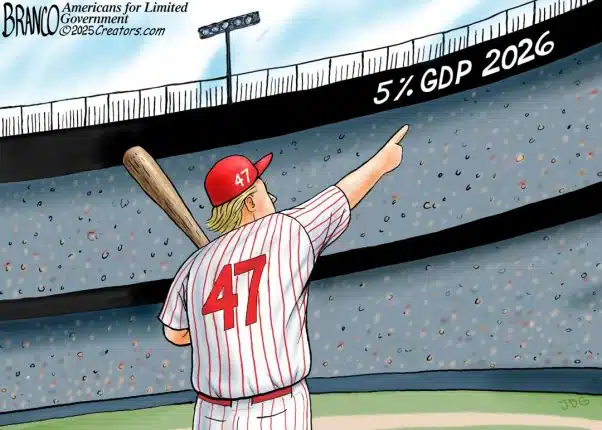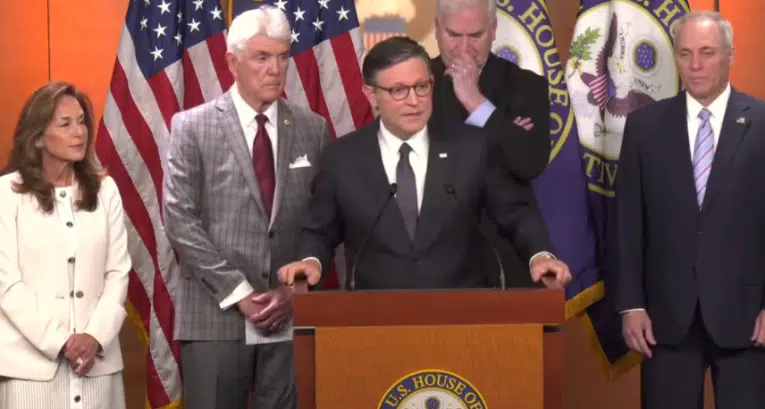By Bill Wilson
$167 billion. That is how much extra the federal government will owe every year in gross interest payments for every point the interest rate on U.S. treasuries rises.
That’s bad, because since Federal Reserve Chairman Ben Bernanke announced on June 18 a potential 2014 sunset to the central bank’s quantitative easing program, 10-year treasuries have jumped from 2.2 percent to 2.57 percent.
If that rate holds, that means an eventual $61 billion additional, annual interest cost to taxpayers. And that’s just for starters.
But the implications are more far-reaching than that. U.S. equities took a major hit upon the announcement. And the UK Telegraph’s Ambrose Evans-Pritchard notes a “side-effect has been a run on emerging markets, a reversal of hot-money inflows into China, and fresh debt jitters in Portugal, Spain, and Italy.”
Therefore, with a single press conference, Bernanke may have single-handedly helped drive up rates, pushed Europe deeper into recession and popped China’s credit bubble.
On one hand the sudden market reaction demonstrates how extremely dependent markets are on guidance from Bernanke and the Fed, the stewards of the dollar, the world’s reserve currency.
But going forward, this may be an extremely bearish indicator. Rising interest rates at the same time as global financial distress can be a potent combination, as they were in 2006 and 2007. Then, they foretold a massive correction that became the Great Recession.
Are we seeing a repeat here? Or a continuation?
Recall that the Great Depression of the early 20th century was not a single event, but a series of events. The stock market crashed in 1929. The Credit Anstalt bank of Austria failed in 1931, setting off a string of bank failures all over the world. The international gold exchange standard crumbled over the succeeding years as it was unable to sustain the excessive credit bubble that had been lent into existence. Another leg of the malaise was hit with the contraction of 1937. And so forth.
So while the central bank may want to hang its hat on talk of recovery, perhaps Bernanke sees more trouble on the horizon and wants to keep the Fed’s powder dry should global developments again put strain on the weak U.S. recovery.
In the meantime, he may be trusting that U.S. financial institutions with $1.9 trillion of excess reserves — funded wholly by the Fed’s quantitative easing — will keep banks afloat with enough of a cushion to withstand any coming storm.
Is Bernanke preparing for a hard landing in China and further trouble in Europe? All indications are the Chinese credit bubble implosion may be about to get underway, with Fitch flashing the warning lights with a fresh downgrade.
“There is no way they can grow out of their asset problems as they did in the past. We think this will be very different from the banking crisis in the late 1990s. With credit at 200 percent of GDP, the numerator is growing twice as fast as the denominator. You can’t grow out of that,” Fitch analyst Charlene Chu noted in a special interview with the Telegraph’s Evans-Pritchard.
As for Europe, there has not been a lack of fresh crises to propel the continent’s sovereign debt crisis forward. Greece’s slim majority held by the ruling conservative-socialist coalition just got slimmer to just a 3 seat margin after the Democratic Left fled the coalition.
Should the coalition there lose its majority, fresh elections might be needed, favoring the insurgent leftist party Syriza, and raising questions about Greece’s commitment to honoring its €300 billion debt. It would also once again throw the Eurozone’s longevity into doubt.
In short, there are too many black swans out there.
In 2008, once the contraction gathered steam, and the Fed had begun lowering interest rates, treasuries rates collapsed across the board in a global flight to safety. A worsening of the European crisis or a collapse in China each could easily have the same effect again.
And if the collateral damage is sufficient in the U.S. — say, unemployment ticks upward again — that, coupled with political pressure to keep the government’s interest payments burden low, could forestall Bernanke’s proposed QE exit after all. There may be no way out.
Bill Wilson is a member of the board of directors of Americans for Limited Government.







